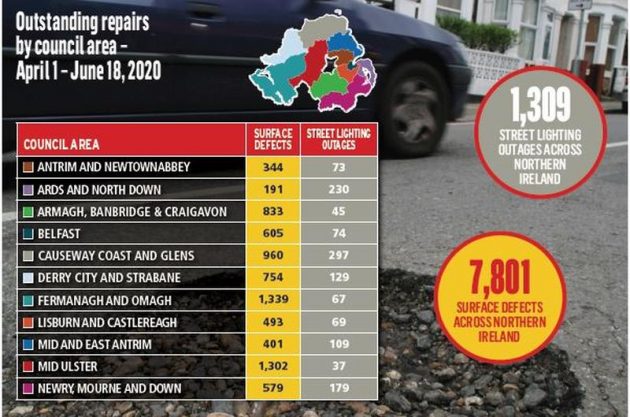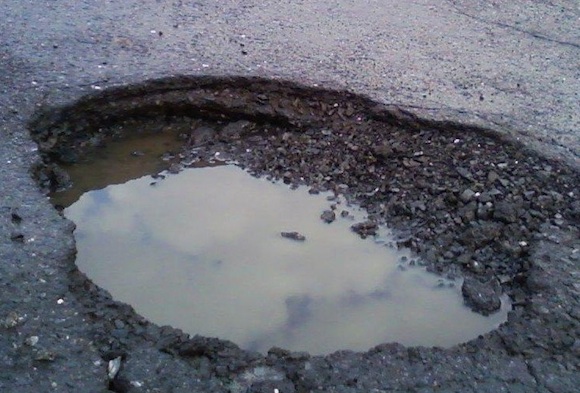 NEW figures reveal hundreds and hundreds of roads across Derry and Strabane are waiting to be repaired as the country eases its way out of lockdown.
NEW figures reveal hundreds and hundreds of roads across Derry and Strabane are waiting to be repaired as the country eases its way out of lockdown.
The Coronavirus pandemic put the brake on contractors fixing potholes and retarmacing of crumbling roadss.
Almost 8,000 road repairs across the North of Ireland have yet to be carried out, according to new figures.
Derry and Strabane Council has the fifth highest number of roads in need of repair with 754.
The Department of Infrastructure also revealed the number of street light outages since the start of April that had not been recorded as being repaired by June 18.
The response time for street lighting repairs is five working days, the department said.
In Derry and Strabane Council there have been 129 reports of street light outages.
The department said the Covid-19 crisis has had an impact on both response times and the recording of information, but added that “contractors have now for the most part returned to work and are working towards our target response time”.
Response times range from one day for serious defects to the next work programme for the least serious, the department said.
In total, 7,801 defects on roads across the North of Ireland were recorded since April 1 and were not noted as being repaired by June 18, the department stated in response to a question from East Antrim MLA Roy Beggs Jr.
A DfI spokesperson said the “response times for the repair of road defects, depending on factors such as their severity and the volume of traffic on the road”.
He said: “They range from one calendar day for the most serious defects, to periods of five working days and four weeks for less serious defects.”
The spokesperson added: “The least serious defects only have to be repaired in the next work programme for that route.”
While the Covid-19 outbreak has affected work, the “response times for the repair of road defects are now generally being met and if for any reason it becomes apparent that the relevant response time cannot be met, then the department has the option of installing signs to warn road users of a possible danger,” according to officials.
“The number of defects in a given area will be influenced by the lengths of roads in the area as well as the road type and usage.
“The timing of the recording of repairs for both road defects and street lighting on the department’s maintenance management system will also influence whether or not a defect is classed as being outstanding.”
In a budget statement to the Assembly, Infrastructure Minister Nichola Mallon last month said funding allocated to the department “does not allow for any significant injection of additional funds to invest in enhancing basic services such as routine road maintenance, which means the road network will continue to deteriorate”.
She added: “This is disappointing as I am keen to get the basics right in delivering services that are essential for local communities and in gaining and maintaining public confidence in what we do.
 “This is an aspiration which, I know, many people share.
“This is an aspiration which, I know, many people share.
“I will continue to make the case for additional money to deliver an appropriate roads maintenance service to meet the changing demands of a modern and economically vibrant society.”
In 2019, the Northern Ireland Audit Office estimated it would cost approximately £1.2bn to upgrade the region’s roads.
It also reported that lack of funding led to a reduction in the number of defects being recorded and approved for repair.
According to a report by the BBC earlier this year, a total of 102,521 road defects were recorded in 2019, a decrease of 24,000 on the previous year.
Tags:




